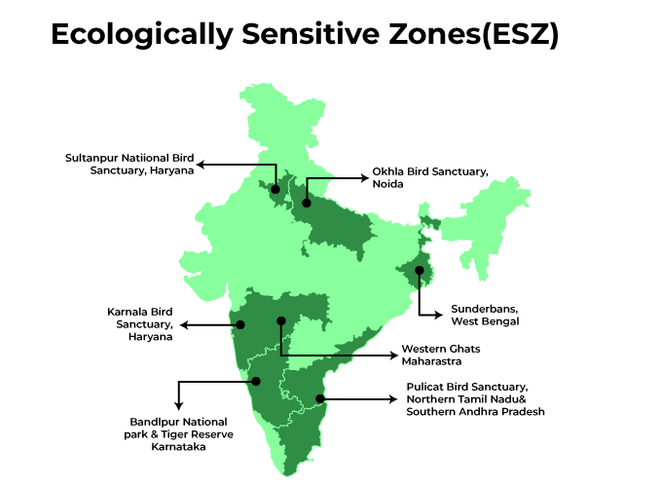Ahmedabad
(Head Office)Address : 506, 3rd EYE THREE (III), Opp. Induben Khakhrawala, Girish Cold Drink Cross Road, CG Road, Navrangpura, Ahmedabad, 380009.
Mobile : 8469231587 / 9586028957
Telephone : 079-40098991
E-mail: dics.upsc@gmail.com

Eco-Sensitive Zones
News: Recently, Eco-sensitive Zones have been met with resistance from protests claiming that compliance with the Environmental Protection Act 1986 and the Wildlife Protection Act 1972 has led authorities to disregard the rights of forest communities and negatively affect their way of life and livelihood.
What are ESZ?
• Eco-Sensitive Zones (ESZs) or Ecologically Fragile Areas (EFAs) are areas notified by the MoEFCC around Protected Areas, National Parks and Wildlife Sanctuaries.
• An ESZ could go up to 10 kilometres around a protected area as provided in the Wildlife Conservation Strategy, 2002.
• Moreover, in the case where sensitive corridors, connectivity and ecologically important patches, crucial for landscape linkage, are beyond 10 km width, these should be included in the ESZs.
What are the activities that can be carried out in ESZ?
• Prohibited Activities - Commercial mining, saw mills, industries causing pollution (air, water, soil, noise etc), establishment of major hydroelectric projects (HEP), commercial use of wood.
• Regulated Activities - Felling of trees, establishment of hotels and resorts, commercial use of natural water, erection of electrical cables, drastic change of agriculture system, e.g., adoption of heavy technology, pesticides etc, widening of roads.
• Permitted Activities - Ongoing agricultural or horticultural practices, rainwater harvesting, organic farming, use of renewable energy sources, adoption of green technology for all activities.
Rationale behind declaring ESZ:
• The facilitate in-situ conservation of species. For example, One-horned Rhinos in Kaziranga.
• It intends to minimize the impact of urbanization.
• The purpose of declaring ESZs is to create some kind of ‘shock absorbers’ to the protected areas by regulating and managing the activities around such areas.
• They also act as a transition zone from areas of high protection to areas involving lesser protection.
• Eco-Sensitive Zones minimize forest depletion and man-animal conflict.
Challenges faced by ESZ:
• They are not in synchronization with Forest rights act and PESA Act. The Forest Rights Act (FRA) 2006, recognises the customary and traditional rights (both individual and collective) of forest-dwellers on forest land, including inside protected areas.
• Similarly, the Provisions of the Panchayat (Extension to Scheduled Areas) Act (PESA) 1996, empower Gram Sabhas to safeguard and preserve community resources on forest and revenue lands in Scheduled Areas.
• However, the MoEFCC has shown no inclination to amend the Indian Forest Act 1927, the Wildlife (Protection) Act and the EPA 1986 to comply with PESA and FRA.
What is the case of Kerala?
• The Western Ghats (WG) cover 48% of Kerala and nearly 30% of the state is covered by forests. There is also a network of lakes, canals and wetlands, as well as a 590-kilometre-long coastline, all of which are governed by a set of environmental conservation laws.
• This leaves little space for its 3.5 crore population, which has a population density of 900 people per square km (much higher than the national average).
• According to an SC directive, at least one km from the boundary of every protected area in Kerala should be marked as ESZ
• The Kerala State Assembly recently unanimously passed a resolution urging the Central Government to exempt the state’s human settlements, farmlands, and public institutions from the ESZ’s scope.
Way Forward:
• There is need to involve local communities in the decision-making process for the management of ESZs.
• It is important to provide alternative livelihood options for local communities who depend on the resources found in ESZs for their livelihoods.

Address : 506, 3rd EYE THREE (III), Opp. Induben Khakhrawala, Girish Cold Drink Cross Road, CG Road, Navrangpura, Ahmedabad, 380009.
Mobile : 8469231587 / 9586028957
Telephone : 079-40098991
E-mail: dics.upsc@gmail.com
Address: A-306, The Landmark, Urjanagar-1, Opp. Spicy Street, Kudasan – Por Road, Kudasan, Gandhinagar – 382421
Mobile : 9723832444 / 9723932444
E-mail: dics.gnagar@gmail.com
Address: 2nd Floor, 9 Shivali Society, L&T Circle, opp. Ratri Bazar, Karelibaugh, Vadodara, 390018
Mobile : 9725692037 / 9725692054
E-mail: dics.vadodara@gmail.com
Address: 403, Raj Victoria, Opp. Pal Walkway, Near Galaxy Circle, Pal, Surat-394510
Mobile : 8401031583 / 8401031587
E-mail: dics.surat@gmail.com
Address: 303,305 K 158 Complex Above Magson, Sindhubhavan Road Ahmedabad-380059
Mobile : 9974751177 / 8469231587
E-mail: dicssbr@gmail.com
Address: 57/17, 2nd Floor, Old Rajinder Nagar Market, Bada Bazaar Marg, Delhi-60
Mobile : 9104830862 / 9104830865
E-mail: dics.newdelhi@gmail.com